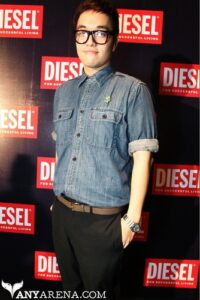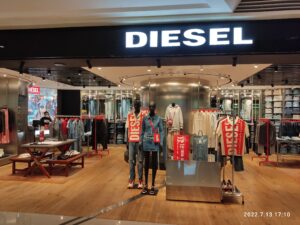When you think of high-end fashion, names like Gucci, Louis Vuitton, and Chanel might spring to mind. But what about Diesel? Is Diesel a designer brand? This question often sparks debate among fashion enthusiasts and shoppers alike. As someone deeply immersed in the world of fashion, I’ve taken a closer look at what sets designer brands apart and where Diesel fits into this glamorous puzzle.
Diesel has long been synonymous with daring and edgy denim, but does that alone qualify it as a designer label? In exploring this, I’ll delve into Diesel’s brand identity, its market positioning, and the unique aesthetic that might just redefine what we consider ‘designer’. Understanding Diesel’s place in the fashion hierarchy not only helps in making informed purchasing decisions but also enriches our appreciation of fashion as an art form. Join me as we unravel the mystique surrounding this iconic brand.
Is Diesel a Designer Brand?
Diesel, known for its bold denim and dynamic fashion presence, has carved a niche in the world of designer brands. I’ll delve into Diesel’s distinctive brand identity and its evolution from a denim pioneer to a staple in designer casual wear.
The Identity and Origins of Diesel
Diesel launched in 1978 by Renzo Rosso in Molvena, Italy. Initially focusing on denim, Diesel, also part of Rosso’s fashion group Only The Brave, quickly expanded to represent a broader lifestyle choice which encompassed a range of apparel and accessories. This Italian company inspired by Renzo’s vision for a brand that would stand for passion, individuality, and self-expression.
With its roots firmly planted in innovative denim designs, Diesel & DIESEL USA distinguished itself with unique washes and manufacturing techniques that appealed to those looking for premium denim brands. As the Diesel brand grew, its product line evolved to include not just denim but also a stylish array of clothing and accessories which embody a rugged, refined aesthetic indicative of high-quality Italian craftsmanship.
How Diesel Differentiates from Other Brands
Diesel sets itself apart from other fashion brands through its approach to fashion marketing and its distinct design philosophy. Renowned for avant-garde tactics, the brand’s advertising campaigns are often provocative, pushing boundaries and challenging societal norms, this helping them to capture the attention of a diverse, young audience worldwide.
Under the guidance of creative directors like Glenn Martens, Diesel remains at the forefront of fashion innovation. Diesel’s recent collections under Glenn’s leadership showcase an adventurous blend of designs that meld high fashion with street level relevance, a hallmark that positions Diesel not just as a fashion brand, but more a symbol of contemporary lifestyle.
Furthermore, Diesel’s commitment to quality and its ability to remain connected with the lifestyle and preferences of young people around the globe continue to give Diesel a distinctive edge in the competitive luxury market. Instead of merely following trends, Diesel creates them, making each piece a staple in the wardrobe of the fashion-conscious.
Through Diesel’s persistent innovation and distinct brand voice, It’s clear why they are considered a key player among designer casual wear brands in the fashion industry.
Milestones in Diesel’s History
In tracing the trajectory of Diesel, I recognize its remarkable transition from a premium denim brand to a titan of the fashion industry. This shift is marked by significant milestones that underline Diesel’s prowess in blending high fashion sensibilities with street-relevant designs.
The Evolution from Denim to Fashion Dominance
Diesel began its journey in 1978, rooted deeply in the creation of jeans that were distinct and durable. Under the guidance of Renzo Rosso, Diesel transformed from focusing primarily on denim to becoming a beacon of full-range luxury fashion. From the introduction of Diesel Black Gold in 2007, a line dedicated to bridging the gap between contemporary casual wear and luxury fashion, to the relentless expansion into Diesel Kid, Diesel Living, and more, the brand’s portfolio diversification stands as a testament to its evolution.
The progression from crafting jeans to fashioning a comprehensive designer casual wear line highlighted Diesel’s ability to innovate and adapt. As the creative directive shifted with the inclusion of Belgian designer Glenn Martens, the brand further established itself with avant-garde designs and strategic positioning in fashion capitals such as New York, which spotlighted Diesel during major events like Fashion Week.
Key Innovations and Collaborations
Diesel’s history is punctuated by innovative design and groundbreaking collaborations that have solidified its status within the luxury fashion sector. Notably, Diesel’s partnership with prominent figures and brands across different categories has spurred creativity and broadened its appeal. Collaborations with celebrities like Julia Fox and influential brands enhance their product lines while resonating deeply with young people globally.
Furthermore, Diesel’s inventive marketing strategies, such as provocative ad campaigns and robust digital communication, have not only cultivated a unique brand image but also captured the attention of a diverse customer base. Each collaboration has served as a vital component in Diesel’s strategy, fortifying its luxury brand identity and reinforcing its commitment to quality and distinctiveness in the fashion world.
Through these developments, Diesel has seamlessly integrated high fashion with everyday functionality, ensuring that each piece from jeans to leather jackets carries the unmistakable stamp of Diesel’s design philosophy. This seamless integration marks Diesel’s ascendance in the fashion industry, setting benchmarks for other premium denim brands.
Diesel in the Fashion Industry
Established as a beacon of innovative design, Diesel has significantly shaped the fashion industry. The brand merges high fashion with practical functionality, distinguishing itself from traditional designer labels.
Contributions to Modern Fashion
Diesel’s influence extends across various facets of modern fashion. Known for its premium denim and designer casual wear, the brand has set benchmarks in the industry. Diesel’s approach involves:
- Reinventing Denim: Launching cutting-edge designs in denim, the brand stays ahead of trends, making it pivotal among premium denim brands.
- Expanding Product Lines: Diesel’s evolution with lines like Diesel Black Gold and Diesel Kid illustrate its versatility beyond basic denim, touching everything from luxury to everyday wear.
- Integrating Technology and Fashion: Diesel’s ad campaigns and Diesel store concepts often feature technological integrations, creating a modern shopping experience that resonates with today’s tech-savvy consumers.
These initiatives show Diesel’s commitment to leading in fashion innovation, not just participating.
Influence on Urban and Youth Culture
Diesel’s impact on urban and youth culture is profound and far-reaching. By tapping into the zeitgeist of contemporary urban lifestyles, Diesel has cultivated a strong following. Highlights of Diesel’s influence include:
- Cultural Resonance: With ad campaigns and collaborations that reflect youth culture, Diesel places itself at the heart of what it means to be young and urban.
- Fashion as a Statement: Diesel clothing often doubles as a medium for personal expression among youth, with designs that speak to a bold, independent lifestyle.
- Community and Lifestyle Branding: By promoting more than just clothing—such as through Diesel Living and partnerships with artists and musicians—Diesel fosters a sense of community among its consumers.
Diesel’s ability to resonate with young, stylish audiences globally enhances its status as a leading fashion brand, cementing its role as an influencer in contemporary culture. Through these endeavors, Diesel doesn’t just participate in the fashion industry; it drives it forward.
The Revival and Future of Diesel
Diesel continues to thrive as a leader in designer casual wear, drawing from its roots in premium denim to invigorate its brand with modern strategies and sustainability initiatives. With Glenn Martens at the helm, the brand’s forward-looking approach positions it well in the evolving fashion landscape.
Strategic Moves for Brand Refresh
In recent years, I’ve observed Diesel making strategic moves to refresh its brand identity and maintain its status in the fashion industry. They’ve adopted innovative marketing strategies and revamped their product lines to appeal to contemporary tastes. Diesel’s recent fashion shows showcased not only their classic denim collection but also their avant-garde designs, blending luxury with functionality in a way that resonates with today’s fashion-forward consumers. Moreover, the introduction of limited-edition collections and collaborations with high-profile figures and artists has further strengthened Diesel’s brand as a staple in luxury fashion. Such collaborations help to keep the offerings fresh and culturally relevant, ensuring that the connection with young, style-conscious audiences remains strong.
Sustainable Practices and Contemporary Directions
Sustainability is another key area where Diesel is making significant strides. By incorporating eco-friendly materials and processes into their production, Diesel is setting an example in the fashion world. Their commitment to reducing the environmental impact of their operations involves the use of responsibly sourced fabrics and the implementation of more sustainable manufacturing techniques. As I delve deeper, it becomes clear that these initiatives are not just about adhering to trends but are a central part of their long-term strategy to align more closely with the values of their consumers. Additionally, Diesel’s recent campaigns focus on promoting a lifestyle that respects the environment, which enhances their image as a contemporary and responsible brand. Through these efforts, Diesel not only secures its place as a leader in the luxury fashion industry but also demonstrates a commitment to the planet and its people.
Diesel has undeniably secured its place as a designer brand with a distinctive blend of innovation, luxury, and cultural relevance. With Renzo Rosso at the helm and Glenn Martens’ creative vision, the brand continues to push the boundaries of traditional fashion. Its commitment to sustainability and adapting to new market dynamics further cements Diesel’s role as a forward-thinking leader in the fashion industry. As Diesel evolves, it remains at the forefront of style and social trends, making it more than just a label but a lifestyle embraced by many around the world.
Frequently Asked Questions
What defines Diesel’s brand identity?
Diesel is recognized for its innovative approach and edgy design aesthetic, which has made it a prominent name in luxury fashion. Under the leadership of Renzo Rosso, Diesel has embraced a bold, rebellious identity that resonates with a youthful audience.
How has Diesel transformed the fashion industry?
Diesiegel has revolutionized the fashion industry with its avant-garde denim designs and successful fusion of high fashion with streetwear. Its contributions extend to unique marketing strategies and product diversifications, setting trends and influencing urban and youth culture.
What role does technology play in Diesel’s operations?
Diesel integrates cutting-edge technology into both its product designs and business operations, enhancing product functionality and optimizing customer engagement. This technological approach supports their innovative marketing and sustainability goals.
What makes Diesel appealing to younger generations?
Diesel appeals to younger demographics through dynamic campaigns and collaborations that reflect contemporary lifestyles and emphasize community and inclusivity. Its designs resonate with the bold and expressive attitudes of youth culture.
What are Diesel’s sustainability initiatives?
Diesel is committed to environmental responsibility, focusing on sustainable practices in its manufacturing processes and product lines. This includes using eco-friendly materials and promoting sustainable consumption behaviors among its customers.
- Is A Polo Shirt Business Casual
- Is Adidas A Designer Brand
- Is Aldo A Designer Brand
- Is Alexander McQueen A Designer Brand
- Is Anne Klein A Designer Brand
- Is Armani A Designer Brand
- Is Balenciaga A Designer Brand
- Is Ben Sherman A Designer Brand
- Is Betsey Johnson A Designer Brand
- Is Bulova A Luxury Brand
- Is Burberry A Designer Brand
- Is Calvin Klein A Designer Brand
- Is Celine A Designer Brand
- Is Champion A Designer Brand
- Is Chanel A Designer Brand
- Is Chloe A Designer Brand
- Is Coach A Luxury Brand
- Is Diesel A Designer Brand
- Is Dior A Designer Brand
- Is DKNY A Designer Brand
- Is Dolce And Gabbana A Designer Brand
- Is Fendi A Designer Brand
- Is Fossil A Designer Brand
- Is Fossil A Good Brand For Watches
- Is French Connection A Designer Brand
- Is Giani Bernini A Designer Brand
- Is Givenchy A Designer Brand
- Is Gucci A Designer Brand
- Is Guess A Designer Brand
- Is H&M A Designer Brand
- Is Hugo Boss A Designer Brand
- Is Invicta A Good Watch Brand
- Is Jimmy Choo A Designer Brand
- Is Juicy Couture A Designer Brand
- Is Kate Spade A Designer Brand
- Is Kenneth Cole A Designer Brand
- Is Kenzo A Designer Brand
- Is Lacoste A Designer Brand
- Is Louis Vuitton A Designer Brand
- Is Mango A Designer Brand
- Is Marc Jacobs A Designer Brand
- Is Michael Kors A Designer Brand
- Is Mkf A Designer Brand
- Is Moncler A Designer Brand
- Is Moschino A Luxury Brand
- Is Nanette Lepore A Designer Brand
- Is Nike A Designer Brand
- Is Nine West A Designer Brand
- Is Prada A Designer Brand
- Is Puma A Designer Brand
- Is Ralph Lauren A Designer Brand
- Is Rebecca Minkoff A Designer Brand
- Is Refined Living About Exclusivity And Limited Access
- Is Rick Owens A Designer Brand
- Is Ted Baker A Designer Brand
- Is Theory A Designer Brand
- Is Tissot A Good Brand
- Is Tom Ford A Designer Brand
- Is Tommy Hilfiger A Designer Brand
- Is Tory Burch A Designer Brand
- Is Valentino A Designer Brand
- Is Vera Bradley A Designer Brand
- Is Vera Wang A Designer Brand
- Is Versace A Designer Brand
- Is Wrangler A Designer Brand
- Is Zara A Designer Brand



